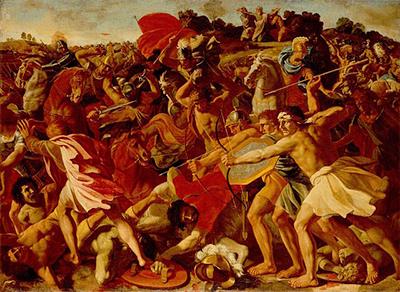 Almost 80 percent of white American evangelicals plan to vote for Donald Trump, a twice-divorced womanizer who made his name building and gilding casinos. A man who insults Hispanics, Muslims, African Americans, women, and anyone else who disagrees with him. A man who rejects foundational Christian principles such as love for enemies, radical forgiveness, turning the other cheek and unqualified hospitality.
Almost 80 percent of white American evangelicals plan to vote for Donald Trump, a twice-divorced womanizer who made his name building and gilding casinos. A man who insults Hispanics, Muslims, African Americans, women, and anyone else who disagrees with him. A man who rejects foundational Christian principles such as love for enemies, radical forgiveness, turning the other cheek and unqualified hospitality.
Let’s admit right off the top that if the vote was restricted to white people Trump would win in a cake walk. In mid-July, 66 percent of registered white voters were planning to vote for Trump, and in some Southern states the figure is close to 90 percent. So, white evangelicals are no more pro-Trump than white folks generally.
Still, shouldn’t we expect that, strictly on moral and theological grounds, disciples of Jesus Christ, red and yellow, black and white, would pass en masse on a man with Trump’s résumé?
No, we should expect nothing of the kind.
For all its apparent diversity, American evangelicalism is dominated by two theological systems, both of which are uncomfortable with the radical words of Jesus.
The Reformed river is fed by John Calvin, a brilliant biblical theologian who ruled Geneva with an iron fist in the mid-16th century. Calvin’s God was sovereign and unchanging (the theological term is “immutable”). If God told Joshua to massacre the Amalekites, man, woman and child, who are we to quibble? However things may appear to a flawed and fallen humanity, Calvin taught, God’s decrees are just and true by definition.
A sovereign and immutable God has one limitation: he can never change his mind. The New Covenant inaugurated by Jesus could not be substantially different from the Old Covenant bequeathed to Moses. The genocidal carnage of Joshua and the Sermon on the Mount may appear irreconcilable, but God can’t change the rules without changing his character. So, Jesus and Joshua don’t just share a name; they share a theological vision. They have to. The unchanging character of God demands it.

When your theology forces you to reconcile Joshua and Jesus, the New Testament teaching on enemy-love, non-resistance, unqualified hospitality and radical forgiveness become inconvenient.
The only popular alternative to Calvinism in American evangelicalism is dispensationalism, a systematic attempt to account for the divergent traditions within the Bible without surrendering the principle of biblical inerrancy. Although God does not change, dispensationalists say, he occasionally changes the rules.
Old School dispensationalists like C.I. Scofield and Lewis Sperry Chafer had a clever solution to the Joshua-Jesus problem. The kingdom teaching found in Matthew, Mark and Luke (including the Sermon on the Mount) were never intended for the Church. Jesus came into this world to establish the kind of earthly kingdom anticipated by the Old Testament prophets, but Israel refused to cooperate. The Church, according to this interpretation, is a kind of Plan B, or “parenthesis,” that will persist until the church is raptured to heaven and the millennial reign begins on earth.
Everything Jesus said about non-violence, enemy-love, and turning the other cheek was never intended for “the Church age,” Scofield and Chafer taught, but will be in full force when Christ sets up his thousand-year reign.
You will be relieved to learn that some Calvinists (like Russell Moore) and some Dispensationalists (like Darrell Bock) are trying to find a middle ground between Reformed and Dispensational theology that makes more room for the teaching of Jesus. Neither Moore nor Bock will be voting for Donald Trump in November and that’s what you would expect. The closer you get to the Savior, the harder it becomes to embrace the Donald. You can love the man, forgive him, struggle to understand him; but you can’t vote for him.
Unfortunately, Russell Moore and Darrell Bock are evangelical outliers. The rhetoric flowing from popular, made-for-TV evangelicalism has assumed a desperate quality. America will only continue to be exceptional if she continues to be Christian, preachers say. If not, our beloved country will become a toxic slough of secularity — Sweden writ large.
It’s the children of light versus the children of darkness and somebody has to lose.
The premonitions of doom issuing from the religious right are reminiscent of Psalm 44, which begins with a celebration of God’s victories in the days of Joshua:
Through thee we push down our foes;
through thy name we tread down our assailants.
For not in my bow do I trust, nor can my sword save me.
But thou hast saved us from our foes,
and hast put to confusion those who hate us.
Suddenly, without a hint of transition, the mood changes:
Thou hast cast us off and abased us,
and hast not gone out with our armies.
Thou hast made us turn back from the foe;
and our enemies have gotten spoil.
Thou hast made us like sheep for slaughter,
and hast scattered us among the nations.
Or, to quote Donald Trump’s paraphrase, “We never win anymore.”
Psalm 44 was likely written about the same time the book of Joshua assumed its present form: shortly after a remnant returned from Babylonian captivity to a heap of ruins that once was Jerusalem.
Books like Deuteronomy and Joshua were written to answer the “why” question. God told us to exterminate the inhabitants of Canaan down to the last sucking infant; but we made our peace with the infidel, marrying their daughters and worshiping their gods.
In Ezra and Nehemiah, the returning exiles divorce their foreign wives and build a big wall around Jerusalem, a line of demarcation between saints and sinners.
Old Testament texts like Joshua and Nehemiah get more attention in America’s white evangelical churches than the words of Jesus. The man who talks about recovering American greatness by building a wall is speaking a language conservative white Christians can understand.
